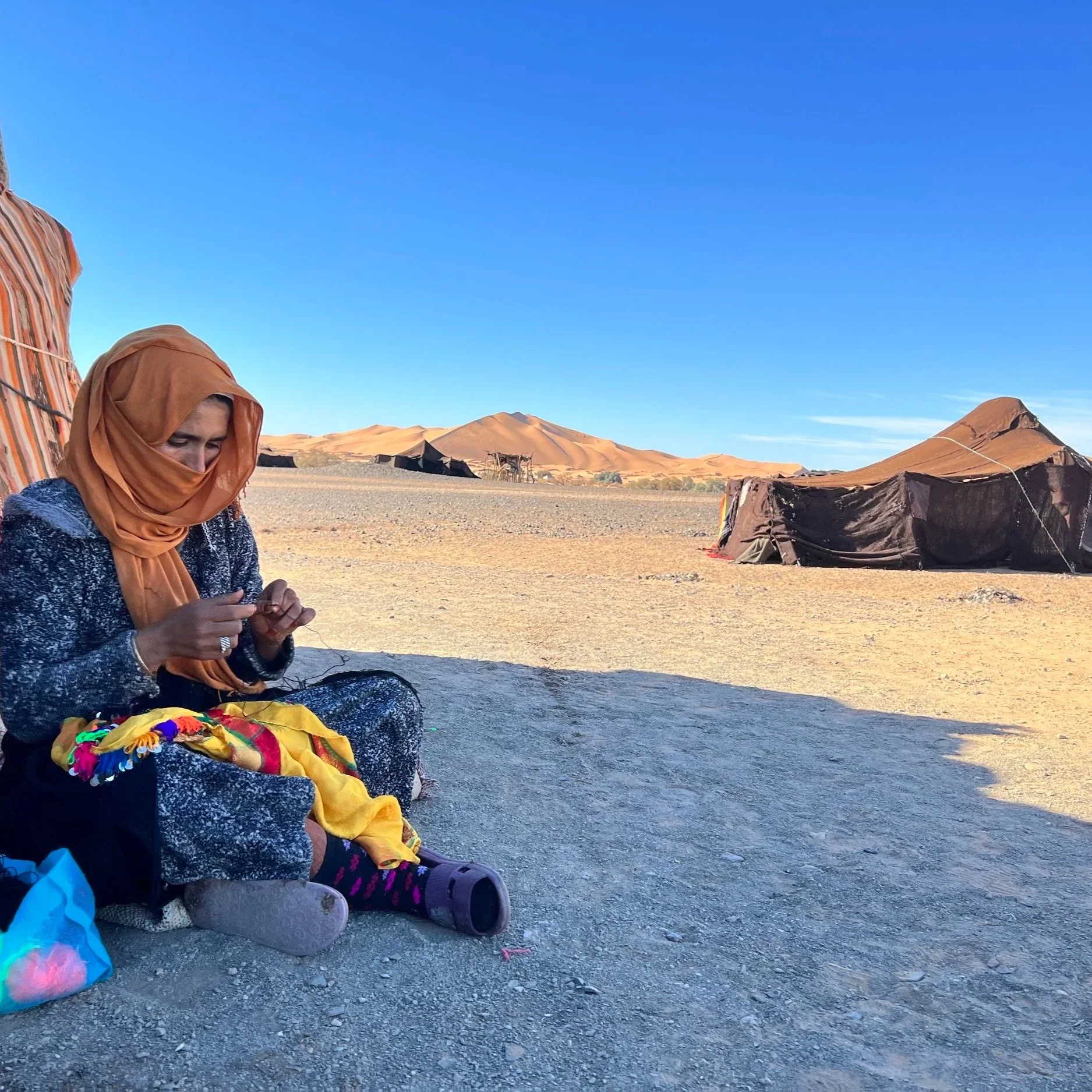Forced to Settle
The Collapse of Nomadic Life in Merzouga
In eastern Morocco, the orange dunes of the Sahara rise like frozen waves, the sun reflecting off the sand in an intense, unrelenting blaze. Traditional Amazigh (Berber) tents of dark brown fabric—open to catch any trace of breeze—stand as fragile shelters against a harsh and changing environment. These tents are now home to families who, over the past four years, have been forced to abandon their nomadic way of life. The Taurag people, a desert dwelling tribe of the Amazigh, once mobile across the desert, now settle near infrastructure simply to survive, their movement restricted by extreme drought and vanishing water sources.
Drought and Water Scarcity in the Sahara
Groundwater depletion and prolonged drought, intensified by deforestation in the Amazon and global climate shifts, have made life in the desert increasingly untenable. Oases that once sustained people and animals have disappeared. Camels and goats, the backbone of nomadic subsistence, have perished where they once thrived. Families are forced to exchange millennia old independence and self-sufficiency for proximity to water and human-made resources.
The Impact on People and Animals
Among those navigating this new reality is Fatima, an elder woman whose hands still move expertly over a hand-made loom. She has lost nearly all her goats; the one remaining is too old to breed or provide milk. When asked what could help her, Fatima could not answer immediately—she tearfully shared tat she had never imagined anyone offering assistance. Hours later, she returned to the question, quietly saying that even one young female goat could provide milk for her children. It was a simple request, but heavy with meaning: a lifeline for survival and a fragment of a life slipping away.
Animals that once provided sustenance, labor, and mobility have suffered alongside the people. Camels and goats perish slowly, unable to reach green leaves or oases, while families struggle to find alternative sources of water and food. The human toll is as visible as the barren landscape: hunger, anxiety, and a profound sense of loss for a culture that is being forced into permanent settlement.
Women Preserving Culture Through Weaving
Old traditions endure through these new hardships. Women like Fatima and her sisters continue to weave carpets on hand-made looms using thick, rough yarn in vibrant colors. Weaving is no longer only cultural—it is essential. Carpets are sold to tourists or local communities, providing limited income in a landscape where traditional livelihoods have been disrupted.
Generosity remains constant in the settlement. Tea and nuts are generously offered to us outside visitors, even when families struggle to feed their own children. The carpets, the loom, and the craft itself are testaments to resilience in the face of environmental collapse, preserving skills and cultural knowledge even as the nomadic way of life fades.
A Life Forced to Change Forever
The settlement of less than 100 people, just behind the iconic dunes of Merzouga is a stark illustration of climate change’s human cost. Drought kills slowly and painfully, forcing families to adapt or perish. Nomadic mobility, once a solution to scarcity and desert extremes, is no longer viable. The animals, once central to survival, vanish. Cultural traditions and self-sufficient practices are disrupted.
Each open tent, every weaving loom, and the few remaining goats tell a story of resilience—but also of permanent loss. The nomadic way of life, intimately tied to the land and sustained by centuries of knowledge, is slipping into history. The Sahara is no longer just a desert; it is a warning. Global environmental changes reverberate here, transforming lives, eroding culture, and leaving families like Fatima’s struggling to survive in the shadow of the dunes.
Call-to-Action
Support the Merzouga families affected by drought. Your donation can provide livestock, weaving supplies, and essential food to help preserve their culture and sustain their livelihoods.
Fatima’s family works to gain a footing in their new way of life


